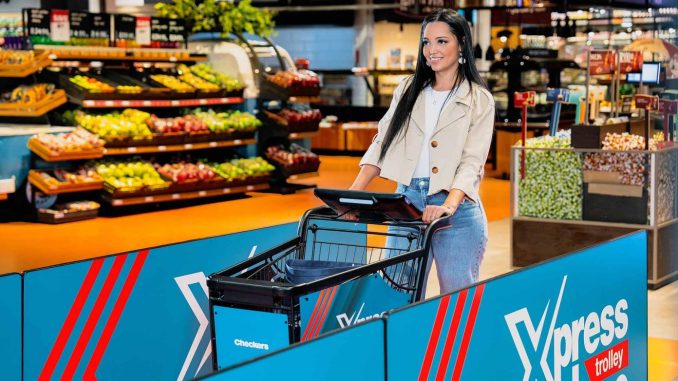
Shoprite’s premium retail chain Checkers has begun testing high-tech “Xpress Trolleys” in Cape Town, marking the first time South African shoppers can use smart carts that allow them to scan products, track spending in real time, and pay directly without going through a traditional checkout line.
The pilot includes 20 trolleys split between Checkers Hyper Brackenfell and Checkers Constantia, where customers have been introduced to the innovation after internal testing by head-office staff.
The process is simple. Shoppers start by scanning their Xtra Savings card on the trolley’s built-in screen before placing items inside. Each product is scanned, and the display shows a live total, special promotions, and even navigation help to find items in store. When finished, customers head to a dedicated lane, pay directly on the trolley using the bank card linked to their Checkers Sixty60 profile, and receive a printed slip before leaving. To ensure smooth use, staff are on hand to guide customers as they adapt to the new system.
The retailer says the initiative is part of its ongoing strategy to combine physical and digital shopping experiences and position Checkers as a leader in convenience-driven retail. Shoprite has already made significant strides in digital innovation with its Sixty60 app, and the trolleys represent another step in building a seamless omnichannel shopping model. Similar technology has been tested internationally by Walmart in Chile, Coles in Australia, and Kroger in the United States, placing South Africa within a broader global movement towards frictionless shopping.
The introduction of smart trolleys has also sparked a debate around labour. Shoprite has stressed that the trial does not threaten jobs, but the South African Commercial, Catering and Allied Workers Union has voiced concern that the widespread adoption of self-service systems could reduce cashier positions in the future.
For now, however, the program remains small and exploratory, with no confirmed timelines or investment figures for a national rollout.
For business analysts, the pilot represents more than just a customer convenience tool. By turning the trolley itself into a point of sale, Checkers could influence shopping behavior, manage store flow more efficiently, and open up new opportunities for targeted promotions through the on-board screens. For consumers, the attraction lies in saving time and gaining control over their spending. For the retail sector, it is a glimpse of how technology may reshape even the most familiar part of daily life.

Leave a Reply